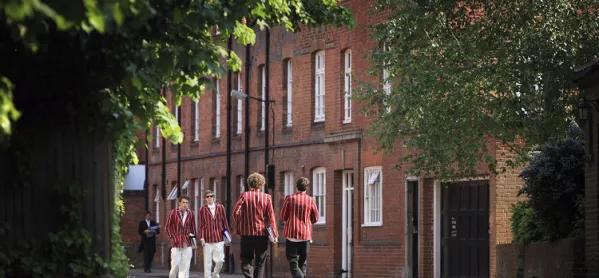Opinion: ‘A-level success among independent schools is down to highly qualified teachers’

Independent schools have achieved impressive A-level results this year, with 50 per cent graded A* and A, against a national average of 25.9 per cent.
One in fourteen independent school candidates achieved three or more A* grades and 19 per cent of entries have achieved one A* grade, against 8 per cent nationally.
Independent schools do well because they teach the traditional facilitating subjects that Russell Group universities require, including modern foreign languages, maths, further maths, physics, chemistry and biology as well as history and geography. There is a trend towards more pupils taking facilitating subjects in the state sector, with more than 51 per cent of all pupils now taking them, but this is not yet enough if all students are to be given a fair chance of access to the best universities.
Some traditional subjects, particularly modern foreign languages, are in decline in this country, with French and German suffering reduced candidate numbers. Yet in independent schools, languages continue to be popular. Pupils from independent schools formed 28 per cent of the entries at A-level in French last year, but were awarded 48 per cent of the A* grades. This is important; without these pupils many university languages departments would not survive.
Independent schools are also particularly good at encouraging girls to take sciences, which are less popular with girls nationally. Only 21 per cent of the 36,000 candidates who took physics A-level this year were female and the figure was even worse in computing, where girls accounted for just 8 per cent of entries. There are many examples of girls in our schools going on to study engineering, computing and other sciences at university after achieving high grades at A-level. For example, at Headington School in Oxford, 61 per cent of pupils took maths at A-level or in the International Baccalaureate (IB) this year and more than 80 per cent continue studying at least one Stem subject (science, technology, engineering or maths).
How do we do it? Independent schools employ teachers who are usually highly qualified specialists in their subject and who can impart enthusiasm and love of learning to pupils. Schools promote a culture of high expectation and high achievement which supports the academic aspirations of students. Students are taught to organise their study time, apply themselves with discipline and cope with the stress of examinations.
At the same time, schools offer a wide range of co-curricular activities, educating pupils as whole people across a broad range of skills and experiences and developing self-confidence and strong self-esteem which is so important when they get out into the real world of work and life.
Independent schools can also exercise freedom to choose the best qualifications and exams for their pupils. It is interesting to note that there has been an 11 per cent rise this year in the number of pupils taking the Extended Project Qualification (EPQ), while nationally the numbers have increased only marginally.
The EPQ is an independent piece of work, usually an essay of about 5,000 words, on a topic of the student’s choice. It provides evidence of commitment, independent thought and organisational skills in independent research and extended writing. Although it is not required by universities, it demonstrates interest in a subject area and, more importantly, will considerably develop and extend the student in preparation for his or her transfer to university studies.
Independent schools can also choose alternatives to A-levels, if they feel it is best for their pupils. There were rises this year in the number of pupils taking the IB, which offers breadth of study into the sixth form, and the Pre U, which offers a demanding two-year linear course. It is likely that during the period of transition - as the new reformed A-levels are introduced this September and the AS is decoupled - that some schools will continue to offer a mix of qualifications, on a subject by subject basis.
Also of note is the high proportion of pupils at independent schools in the North of England who have also achieved the A* grade. This bucks a national trend described by the Joint Council for Qualifications last week, whereby students in the North performed significantly worse in the top grades than those in the South East.
There are many examples of independent schools in the North, some in areas of disadvantage, that continue to achieve at the highest level, as some of our top performing schools in Newcastle, Liverpool and Manchester demonstrate. At Merchant Taylors’ Girls’ School in Crosby, for example, which has a wide catchment area, 90 per cent of language entries achieved 90 per cent A* and A grades. At Manchester High School for Girls, where 10 per cent of pupils have bursaries and 5 per cent pay no fees at all, six girls this year are taking up Oxbridge places.
Our schools are keen to share this expertise and many, such as King’s College School, Wimbledon or the City of York Partnership have shared revision classes and university preparation advice with local state school students to support their university chances too.
Although independent schools continue to achieve excellent results and are keen to share those standards with neighbouring state schools, all A-level students achieving good grades should be proud of the results of their hard work and application.
Keep reading for just £1 per month
You've reached your limit of free articles this month. Subscribe for £1 per month for three months and get:
- Unlimited access to all Tes magazine content
- Exclusive subscriber-only stories
- Award-winning email newsletters



